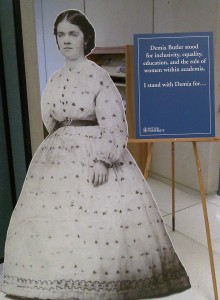“I am at the University where I come every morning to do my duty as Secretary which office I presumed you have read I have now the honor of holding. I find it rather pleasant as it only keeps me busy during the morning. I am taking a commercial course which I think rather tiresome. Perhaps you will think me rather masculine in my choice of pursuits but I have always had ambition to do something for myself and I would prefer keeping books to anything else that is placed in woman’s reach.”
– Demia Bulter to Scot Butler, 26 October 1863
Butler Beat Clip with Demia member
What is the purpose of Demia and What Do We Do?
What is “intersectionality” and why is it important?
Intersectionality is the understanding that a person’s experiences are not only because of one facet of their identity (such as gender) but all facets of their identity including but not limited to race, class, sex, gender, sexuality, age, able-bodiedness, religion, ethnicity, etc. Intersectionality is important because when thinking about issues in society, we must think of them through an intersectional lens.
What does “Demia” mean?
Demia was the name of Butler University founder Ovid Butler’s daughter.
The organization was created in the fall of 1991 in response to the need for a feminist community on campus in order to create an environment of support & activism.

